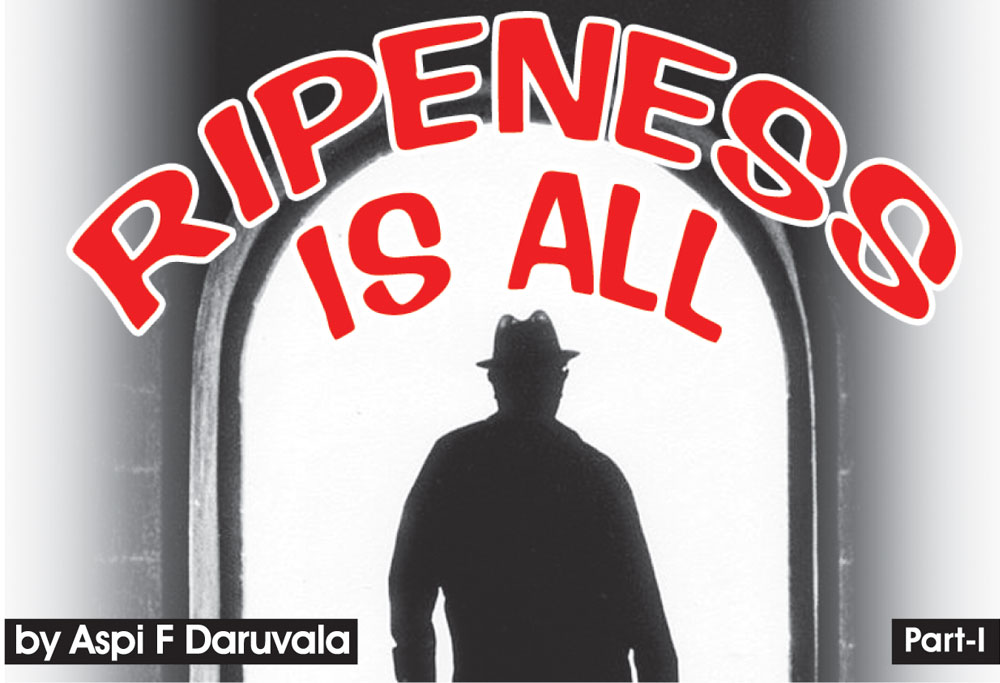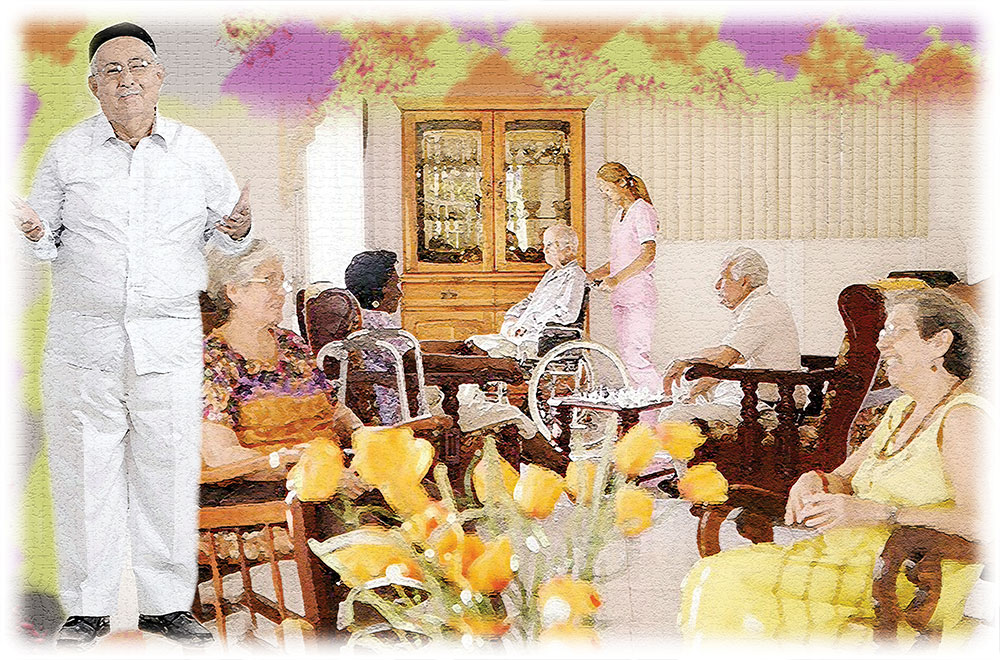THE ORCHARD ON FIRE
- 20 Apr - 26 Apr, 2024

The stars too die, the dying stars they call them.
When seemed immortal, they tearless meet their doomed end.
Why man must you grieve your death?
Muncherjee looked outside the window from the hospital bed. It was a clear night and the stars were out. But the clear sky and the bright stars failed to cheer the gloomy patient.
When he had been admitted to the hospital a month ago, the small narrow general ward had been fully occupied; but a couple of fatalities, and then two patients recouping and being discharged, had left him the sole occupant, and loneliness had deepened the gloom. In the last few weeks he had grown extremely week, and having broken his leg as well he was unable to move on his own. Now cranky and irritable, he often regressed to a half-conscious state, unable to distinguish between the dream world and the living world; but in those short interval, when in full control of his senses, he could well surmise that his end was near.
He had just been served dinner, and it being Sunday the menu had provided him his favourite dhansak meal, which was followed by a fine hospital-type custard dessert. The meal had perked him up somewhat, but then he was suddenly disturbed by a loud wail from Putloo, a patient in the old-women’s ward. The wailing continued in various shades of treble and soprano in a call to the attendants. “Take me out, please wheel me out to the veranda, please,” she shouted; and as though to balance the musical performance, it was punctuated by a heavy bass voice from the formidable octogenarian, Mustimai.
“Shut up! For God’s sake, shut up! You get on my nerves,” Mustimai yelled.
Then apparently Mustimai lost her patience, for awful shrieks now rent the air, “Murder! Save me! Oh my father! Oh my mother! Mustimai is going to kill me, hitting me so hard on the head.”
All this noise perforce disturbed Muncherjee. Here he was in the hospital where one could expect peace and tranquillity, and he found nothing but continuous pandemonium. However, the trident shrieks from Putloo brought the supervisor out from her office, and with alternate scolding, pleading and coaxing sorted the matter, bringing about a change of atmosphere with a semblance of sanity.
Now with nothing, to occupy Muncherjee, he lay prostrate in his bed in the corner of the ward, and fell into brooding. Where was all the care in his life leading up too? From his earliest years, beginning with his years in school, with the prodding and exhortations from his teachers for a fleeting delusion of progress, leading to his years of working life with pressure from his supervisors; friendly or foolishly offensive, leading him to nothing in his dying old age, but dross. The surroundings of shining silver trophies, the grand panelled walls, the parquet flooring of colleges and academies, the services of moustachioed waiters with broad golden belts and on silver plates, led to this nothingness now beckoning. From this drowsy depressed state he was fortunately woke up to sounds from the hospital corridor, of a shuffling of feet accompanied by a noisy squabble from ward-boys, indicating some work was being jointly handled.
Then four ward boys entered the ward, jerkily carrying a patient on a stretcher. A chorus of voices sprung up as they moved in. “Dump him into bed number two. Hey, you be careful.
“I bet...” said one junior ward boy.
“Hey, what you bet?” asked the senior ward boy.
“I bet this one here goes before the one in the corner.”
“Hey! You keep it low; the other one hears you and he’ll go bawling. He’ll bawl your head off. You know what lungs he got.”
Two of the ward boys started arguing about the patient’s placement.
After they had deposited the patient safely in bed, the senior ward boy warned the new patient, “Now papa, you old man! You don’t move from your bed till the nurse or doctor comes and sees you, or else we’ll have to move you out soon and maybe in another condition.”
“Thank you,” a patient replied in a weak voice.
“What’s the thank you for? We’ve done our job,” one ward boy said.
“Yeah! Especially when helping someone who’s almost dying; so no need of thanking us,” one of the ward boys spoke.
“You shut up!” the senior ward boy scolded them. “You’re gone mad or something? Why are you talking like that? Come, let’s go.”
Muncherjee sidled on his bed, turning onto his right side, to eye the new patient. He saw an old face on a shrivelled boy, and Muncherjee muttered, “Two eyes, a nose and a chin, with a lot of nonsense in between that’s the summation of man. And God! I must in my own shrunken form appear to others like this picture here.”
And then Muncherjee saw his new mate lift his spindly arms up in prayer asking for an early end of his life. Muncherjee was shocked, but he greeted the new patient, and discovered he was called Rustom.
Late at night Dr Williams came into the ward with a consulting surgeon.
“How are you today, Rustom?” Muncherjee heard Dr Williams’ query.
“Not too well,” Rustom replied.
The consulting surgeon shook his head gravely and said, “The left foot is rather bad. The whole leg is gone. The medical report gives it out as gangrene. Needs to be operated and that’s amputation. My God! This stink should be detectable a hundred yards from here.” Muncherjee saw Dr Williams give the surgeon a severe look, before he spoke to Rustom. “Rustom, we need your permission to operate your leg. It’s urgent.”
“What operation?”
“Your left leg. It’s gone. It has to be amputated. There’s no other way.”
“No!” said Rustom.
“If we don’t operate, you’ll die.”
“Let me die, then.”
“It’s late night and you’re tired, I’m sure. We’ll see you early in the morning, tomorrow. No dinner. No breakfast. We’ll give you a drip.”
“He’s in such a weak state,” the surgeon said, “I would have hated to operate, if only his leg has not rotten that badly.”
Muncherjee saw Dr Williams give the surgeon another severe look, and then they both left the ward.
Muncherjee woke up late the next morning and found Rustom had been shifted to the operation theatre. The day passed uneventful and in the evening Muncherjee enquired about the new patient. He was told Rustom was in the I.C.U. and with little change for recovery he was surely dying. And the next morning Muncherjee found him in bed number two a corpse. Nurse Peters and the ward boys were surrounding the bed.
“Well,” said Nurse Peters, “so he’s gone. Another one away! Now what are we waiting for? Get him ready. Do I have to drill you every time there’s a corpse? Shut his eyes up with a bandage. There, now those eyes will not see evil anymore. Somebody shut his mouth up. No fool! You don’t gag him up like a bandit. The bandage goes over his head and under his chin. Good! No more evil that tongue will speak. Pity there’s no drill for the ears they may go wagging, but we’ll make it up with the ankles. Now the knee won’t bend. Splendid boys! You’re experts, now. Go call the ambulance and on with the journey. Grant Road! Grant Road!”
“No reverence! No reverence,” Muncherjee muttered.
A little while later the corpse was taken away on a stretcher while Muncherjee shuddered. Rustom was dead and gone, and Muncherjee felt life was dealing him too an unfair blow, for he knew he too was dying, and dying before he was ready to go, unlike Rustom who had even prayed asking for an end to his life.

In the afternoon, while Muncherjee was nodding half asleep, he was woken up by the familiar voice of Dr Williams! “And gentleman, how are we?” Dr Williams queried, as he went through a quick check-up, glancing at the bed-side chart.
“Look Doc. No pretending. How long have I left to live?”
“The same question again. Does anyone rightly know the answer? Cancel! Broken leg! Old age! And aren’t we doing all we can for you?”
“Doc. I have a right to know. A month?”
“Is it a fair question? Is it an honest question? Rustom went so suddenly. Now don’t you have any friends who could visit you? Cheer you up a bit.”
“All dead. Major Asad, a good friend was the last to go.”
“We all have to go some time,” said Dr Williams, as he made ready to leave. “Wait a minute, doctor. You’re not leaving. Not till I get this matter settled, about how I go. I mean after I die. I don’t want to be trundled out like a crate of oranges, the way Rustom was dispatched.”
“I don’t understand,” said Dr Williams.
“Nurse Peters has ways of showing indignities to a corpse.”
“Well, I’ll make sure Nurse Peters does not allow indignities to corpses again. Does that satisfy you? Am I free to leave now?” Muncherjee nodded in response.
Now private servants of patients in the private wards were in the veranda, engaged in petty quarrels and loud conversation.
“Eggs are Rs. 40 a dozen. Yes! Yes! But why eat eggs? Have tea and toast instead. And as I was telling you, my son has been promoted to high school. He’ll grow up to be an officer in a bank.”
“Oh! Oh! My son matriculated and he is a taxi driver.”
All this noise threw Muncherjee in a rage. “Stop it at once, all of you in this corridor. Shut up, before I have your mouths plugged. Can’t a man have peace to think?”
“What do you have to think about? Attending a cabinet meeting tomorrow?” Then came the report.
“Ha! Ha! That’s one better than the price of eggs.”
Then one in a more sedate voice cried out, “Let’s move away from here to a place where there are no mad patients around.” And the servants moved away.
“What an inconsiderate world!” Muncherjee mumbled. Here he was dying, but did the world care? And he had to be bothered with their quarrels over the price of eggs and women’s gloating over the progress of their children in school. As if that was what the world was about!
Near his window sill Muncherjee saw some movement a row of ants making progress upwards towards the ceiling. “Yes, move on with your journey,” he mumbled.
Then he heard a voice echoing in the distance, “Look at the progress report, Muncherjee. This won’t do. You dream too much. What do you want to become when you grow up, a dish washer? We want better results.”
Muncherjee mumbled some more, “Yes, your whole world is a struggle for progress and advancement. To what purpose? So that when your end comes your rotting body is attended to in ceremonial fashion.”
“Gentlemen, let me introduce you to our star salesman for the year, Muncherjee!”
Muncherjee could hear the applause coming through the window.
“Ah! Muncherjee. Bravo Muncherjee!”
to be continued...
COMMENTS